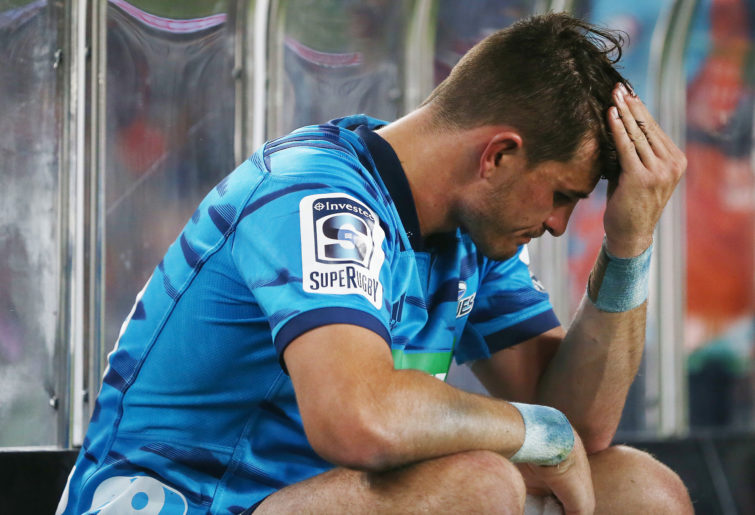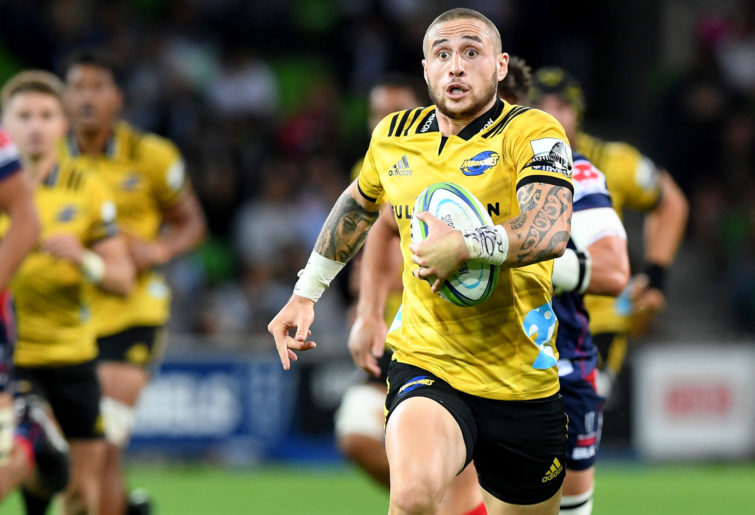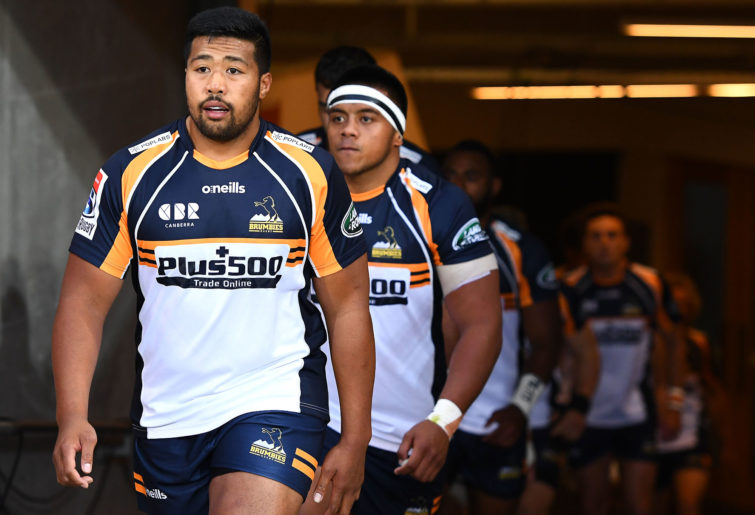So we’ve almost made it – just a month to go until the end of the regular season of the 2019 Super Rugby competition.
Five rounds left and for some just four matches left to confirm their place in the finals or be left frustrated and thinking how best to spend the winter.
It’s now or never for some and in Round 13 we saw some teams bringing a real do or die level of intensity to their performance.
So with the stakes getting higher, what are the talking points that came out of another weekend of Super Rugby…
Take the freaking points!
This season we’ve seen far more close games than last year… In 2018 there were 39 losing bonus points earned in the entire regular season.
In 2019 we’ve had 39 losing bonus points already and still have five more rounds to go. At this rate we’ll have had over 50 games this season that have ended with the teams within seven points of each other.
The reasons behind this would be interesting to explore, but for now let’s focus on an important point that many teams are neglecting to learn – there is a time when going for the try is not the best option… take the points!
The Blues fell victim to this tunnel vision on against the Canes on Friday. For a while in the game, the Blues were trailing by only two points and had the Canes camped in their own 22.
They were putting so much pressure on the Canes defence but couldn’t quite seem to cross the white line. But they were awarded several penalties.
It’s easy to say with hindsight but they really need someone on the field to take a breath and say “We’re not getting over the line right now – let’s take the three, keep the scoreboard ticking over in our favour and get back down here quickly.”
In the end the home side tried time and again to get the try. They failed and in doing so the Canes got a huge motivation boost as well as not conceding a single point.
Come the final whistle not only had the Blues lost but they’d lost by 10 and so went home with nothing to show from a game where they had deserved points.
With the gaps between qualifying and not qualifying likely to be very tight this year, every point is going to be precious.
Just look at how the maturing Reds took the penalty goal right at the end of their loss against the Rebels – they recognise the importance of that losing bonus point.

(Photo by Anthony Au-Yeung/Getty Images)
Blues desperately missing some more experience
Speaking of the Blues, you’ve got to feel for them. Against arguably the best team in the competition right now, they threw absolutely everything at them and had the Canes on the back foot for huge periods of time.
In the first half they had 70 per cent of the territory and almost 70 per cent of the possession. At times in the game they in the Canes 22 for so long that fans sitting behind the Blues posts couldn’t have been criticised for asking for some money back on their ticket, so far from the action were they.
But they just could not turn all this ball in the red zone into the points they needed. Mistakes, poor choices and some impressive Canes defence saw them come away with so little reward that even the Canes looked surprised.
The effort was there to see and obviously they did a lot right to get to those positions in the first place, but it’s a very different set of skills to score tries compared to make metres and the Blues just don’t have those skills right now in enough of their players.
The good news is though they’ve got heart and commitment to each other and the jersey – if they can keep that, bring on some of their younger talent like Otere Black and perhaps attract one or two more decent players then they could look quite different in 2020.
Changing of the guard in the All Blacks pecking order?
This one is sort of two talking points in one but given that it’s a World Cup year, it’s interesting to consider it from the international point of view. Has the number one half back pairing for the All Blacks switched?
Previously it’s been Aaron Smith and Beauden Barrett who have had the starting spots at No.9 and No.10 and it’s been hard to argue against.
However this season, their respective understudies – TJ Perenara and Richie Mo’unga – have really stepped up their games and are in fantastic form.
Against the Blues, Perenara had to focus on his defence and he was impressive. The way in which he hassled the Blues No.8 and No.9 at scrum time caused the home side trouble time and again and he was a constant thorn in their side.
Meanwhile, Mo’unga had a great game back after missing last week. Two early tries, five conversions and a commanding performance away from home saw him lead his Crusaders to a very impressive win over the Bulls.
To be fair Beauden Barrett is also playing well at the moment and Aaron Smith is not too bad (although not in career best form it could be argued). So while it’s a tough choice for Steve Hansen to make, he doesn’t deserve any sympathy!
Who would you pick to start at scrum and flyhalf for the All Blacks because right now the pairing of Perenara and Mo’unga look devastating?
One other question – can you name another international side that has this level of competition for two key spots just a few months from the World Cup opening game?

(AAP Image/Joe Castro)
Cards are devastating – except when they aren’t
Over the past couple of weeks we’ve seen a fair number of cards and it’s been interesting to see how much they have impacted teams and the results of their matches.
This weekend we saw the Canes go down to ten men halfway into the second half. They were under incredible pressure by the Blues but during that ten minutes the Canes managed to keep the damage down to five points. They ended up winning by ten come the final whistle.
They kept their structure in defence and kept forcing the Blues to make mistakes who really struggled to turn the man advantage into an actual advantage.
Meanwhile, the Reds had two men sin binned – one early in the first half and one for early in the second half – and during those times they conceded 17 points and lost the game by just six points.
These were the 10th and 11th yellow cards of the season for the Reds and they are definitely a side that cannot afford to give the opposition any sort of advantage.
So what is it that allows some teams to cope so much better than others? How much do teams train for these situations and what does that training look like.
The Reds you’d have to assume do train for it seeing as how they’ve had to deal with the situation 11 times this season but that training doesn’t seem to have helped!
Equally do teams practice/discuss how they will take advantage when their opponents go down a man. This ability to pivot and adjust both defensive and attacking styles is critical and it’s interesting to see how the best deal with these situations.
Brumbies more than just a maul
After last week’s win over the Blues, the Brumbies attracted some surprising criticism for being two dimensional and relying entirely on the rolling maul to score any points.
Now it’s hard to argue that the men from Canberra do like the old kick to the corner especially when Folau Fainga’a sits in number one spot on the top try scorers list.
So it would have given the team and coaches a lot of pleasure to put in such an impressive performance this week against the Sunwolves.
Now yes, the Sunwolves are bottom of the ladder so beating them doesn’t deserve front page news. However, it’s worth remembering that the Sunwolves have beaten both the Waratahs and Chiefs this year and have pushed several other sides close.
Remember as well that Sunwolves winger, Semisi Masirewa, is fourth in the top try scorers list for the season.
The Brumbies were able to keep the Sunwolves under control for 80 minutes and didn’t let them score a single point. Also – four of their five tries came from backs rather than the forwards.
Scoring five tries against the Sunwolves isn’t anything too exciting. But scoring five tries against them, and not letting them score a single point, and scoring your own points through a variety of styles (none of which were the rolling maul), and racking up their fourth win from five games, and taking the lead in the Australian conference with just a few rounds to go is actually something to get excited about.

(Photo by Quinn Rooney/Getty Images)
Please let’s not let the refereeing slip now
All in all it’s been a pretty good season from the referees so far. There have been a few games where fans have been frustrated because of decisions or what they felt was bias, but overall there haven’t been any ongoing debates about the standard of officiating dropping and letting the players and fans down.
So it was frustrating this weekend to see a few too many instances where the men with the whistle seemed to be having too much of an impact on the game.
In particular the Jaguares seemed to cop a few penalties that left everyone a bit bemused and the Tahs must still have the sound of the ref’s whistle ringing in their ears!
In that Tahs game there was one decision that caught the attention of many fans and pundits and ironically it was one where the ref seemed to forget he had a whistle.
It was just a few minutes into the second half and the game was tight – only two points between the sides. The Tahs had won the first half and despite not at all being error free, it was a gutsy performance that was causing the Lions trouble.
There was a pass/off load from one of the Lions during a break away and it looked so obviously forward that some fans might have thought they were watching NFL.
Now there are times that forward passes can be hard to judge because of camera angles or pitch position. But this one took place – helpfully – in line with the 10m line so it was easy to see that the point where the ball was released was well behind where the ball was caught. What’s worse is that the referee had kept up with play and was right next to the incident.
Now as mentioned before, the standard of refereeing so far this season has been good. But let’s hope, as we get into the business end of the competition where matches matter even more and are getting more scrutiny, that the men in charge don’t panic and start to ruin the games they are overseeing.
Scott Johnson must be wondering what he’s signed up for
The new Director of Rugby for Australia wouldn’t be blamed for waking up on Monday morning, lying there in his bed and wondering “What the hell have I got myself into?”
In his first few months in the role, he’s seen the Australian Super Rugby sides struggle to compete with both the Kiwi and Saffer sides far too often leading to only two of the Aussie sides sitting in the top 11 on the Super Rugby ladder right now.
He’s seen the top scorer in Super Rugby history and the major strike weapon for the Wallabies get himself into a situation where he’s likely to not be available for future selection.
Then this weekend he will have likely be reminded of the RA rules that mean that Scott Fardy and Will Skelton – two players who have had very good seasons for Leinster and Saracens up in Europe and who both starred in the Heineken Cup Final – remain unselectable because they are playing overseas.
Wouldn’t be a surprise if Johnson wanted to have a chat this week with Raelene Castle and ask her why RA seems intent on shooting itself in both feet while standing in a tank of hungry piranhas.

(Photo by Atsushi Tomura/Getty Images)
Is leaving talent on the bench an effective strategy?
This weekend saw the Jaguares use an approach that a few other teams have tried this season to varying levels of success – leaving significant numbers of starters on the bench and having them come on in the second half.
For the Jags there were four internationals who usually start for the Argentinians warming the bench in Dunedin. When they came on it was quite something to see so much experience coming onto the pitch rather than leaving it – but did it work? Well, as the scoreboard will tell you – no, no it didn’t.
But does this mean this is always a crazy tactic, or is there something in this that other teams should consider? Eddie Jones for a while in 2017 had what he called his Finishers on the bench – players of genuine talent and experience coming on in around the 60th minute who brought pace and skill to the game at a time when the opposition were beginning to tire.
It worked well for England for a while and gave a new dimension to the subs bench – they became a genuine part of match strategy and not just there for when the best players got tired or injured.
Can this be replicated successfully in Super Rugby? Well the Jags gave it a go and it didn’t work but is it worth sticking with?
































































































